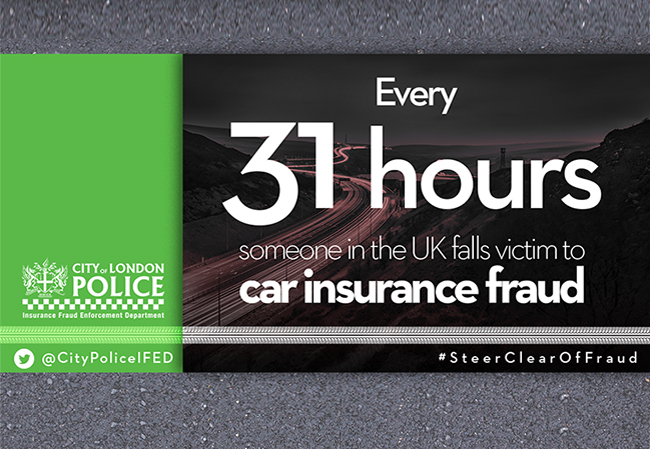Cost of car insurance fraud to victims revealed in new police campaign
Tuesday February 6, 2018

- City of London Police’s Insurance Fraud Enforcement Department launches campaign to raise awareness of fraudsters selling fake car insurance and warn motorists to ‘Steer Clear of Fraud’
- Over 850 reports of ghost broking have been reported to Action Fraud in last three years, with reported losses from individuals and organisations totalling £631,000
- Individual victims of ghost brokers lose on average £769
- Ghost brokers typically target men in their 20s, using social media
The City of London Police’s Insurance Fraud Enforcement Department (IFED) has launched a national awareness campaign today to warn motorists about the dangers of buying fake car insurance from fraudsters, also known as ‘ghost brokers’, who are potentially leaving thousands1 of unsuspecting victims driving without insurance.
Extent of the problem
From November 2014 – October 2017, Action Fraud, the national fraud and cyber reporting centre, hosted by the City of London Police, received more than 850 reports linked to ghost broking, with reported losses for both individuals and organisations totalling £631,0002. On average, each individual victim lost £7693 from this type of fraud.
Of these reports, 417 resulted in action being taken against the offenders by IFED following their investigations into ghost broking over the past three years, which included a man who set up 133 fake policies, a teenage ghost broker who was sentenced to jail and a man who made £59,000 from ghost broking.
However, it is thought that the true number of ghost broking victims may be much higher than this figure, as some motorists may be driving on the roads right now unaware that their policy is fraudulent. It is only when they are stopped by police or attempt to make a claim will they find out that they don’t have genuine cover.
This leads police to believe that ghost broking is actually being under reported each year due to the way ghost brokers deceive motorists into thinking they have legitimate insurance, when in fact it’s worthless.
What is ghost broking?
Ghost broking is the name given to a tactic used by fraudsters who sell fraudulent car insurance by a number of different methods. They typically carry out the fraud by one of three ways: they will either forge insurance documents, falsify the driver’s details to bring the price down or take out a genuine policy, before cancelling it soon after and claiming the refund plus the victim’s money.
It is a legal obligation to have valid car insurance and without it victims will experience the severe harm caused by ghost broking, including:
- Points on their driving licence
- Vehicle seizure and possible destruction of it
- A fixed penalty notice
- Costs to retrieve impounded vehicle
- Liable for claims costs if involved in an accident
This is on top of the money motorists will have lost buying the invalid car insurance and the money they will have to spend to then buy a legitimate insurance policy.
IFED analysis into the ghost broking reports reveals that men, aged 20-29, are most likely to get targeted and that the most common method ghost brokers will use to make initial contact with people is through social media, particularly Facebook and Instagram. Other contact methods include adverts in newspapers and magazines, cold calls and being introduced, either directly or by friends, family members or work colleagues.
Stay safe when buying car insurance
In light of these worrying figures, IFED is encouraging drivers to be wary of heavily discounted prices on the internet or cheap prices they’re offered directly for car insurance, as they may well be ghost brokers.
Throughout the campaign, IFED will be sending out messages on social media using the hashtag #SteerClearOfFraud to tell people how they can protect themselves, while leaflets about ghost broking will also be made available free to download on IFED’s dedicated ghost broking website.
IFED is issuing the following advice and tips to help drivers avoid falling victim to ghost brokers:
- Trust your instincts – if an offer looks too good to be true, then it probably is.
- Ghost brokers often advertise on student websites or money-saving forums, university notice boards and marketplace websites. They may also try to sell insurance policies in pubs, clubs or bars, newsagents and car repair shops.
- Be wary of ghost brokers using only mobile phone or email as a way of contact. Ghost brokers have even been reported using messaging apps, including WhatsApp, Snapchat and Facebook. Fraudsters don’t want to be traced after they’ve taken your money.
- If you are not sure about the broker, check on the Financial Conduct Authority or the British Insurance Brokers’ Association website for a full list of all authorised insurance brokers: register.fca.org.uk and biba.org.uk.
- You can also contact the insurance company directly to verify the broker’s details.
- You can check to see if your car is legitimately insured on the Motor Insurance Database website: ownvehicle.askmid.com.
Detective Chief Inspector Andy Fyfe, Head of the City of London Police’s Insurance Fraud Enforcement Department, said:
“Ghost brokers trick unsuspecting victims with offers of heavily discounted car insurance, leaving them with a policy that isn’t worth the paper it’s written on and open to the severe harm that comes with driving without valid insurance. Being able to drive is vital for a lot people, whether it be to get to work or pick up their children from school or nursery, so if they fall victim to a ghost broker it could not only impact on them financially but also seriously affect their day to day life and make things very difficult.
“As well as the personal harm experienced by victims, ghost brokers also cause financial harm to the insurance industry, driving up the cost of insurance premiums for all motorists.
“While an offer of cheap car insurance may seem tempting, falling victim to ghost broking will end up costing you far more in the long run – both in terms of money and your licence.”
Mark Allen, Fraud and Financial Crime Manager at the Association of British Insurers (ABI), said:
“Driving without valid motor insurance is a crime full stop. Always be on your guard against someone offering you a deal that looks too good to be true. The chances of you getting caught are greater than ever, and a criminal conviction for driving uninsured will make getting future insurance much more expensive. Stay legal on the road by shopping around in a very competitive motor insurance market for the right motor insurance policy at the best price.”
Ben Fletcher, Director of the Insurance Fraud Bureau, said:
“Ghost broking is a complex issue and one that we do not take lightly. Ghost brokers often target vulnerable people or communities, but we do also sometimes see cases where people have knowingly bought fraudulent or invalid policies in an effort to pinch the pennies.
“It is essential that we raise awareness about the issue of ghost broking to stop innocent victims being targeted and to educate those who may consider buying insurance from a disreputable source. We work closely with police and insurers to track all those involved in ghost broking scams in order to bring about charges for those guilty parties.”
If you have or think you have been a victim of ghost broking, get in touch with IFED via phone on 0207 164 8200 or email at IFEDIntel@cityoflondon.pnn.police.uk. Alternatively, report it to Action Fraud by calling 0300 123 2040.
You can also report to the IFB’s Cheatline by completing their online form or by calling anonymously and in confidence on 0800 422 0421.
ENDS
Notes to editors:
1While some reports can be for a ghost broker with just one victim, typically they are associated to a ghost broker who has defrauded multiple people, with some of them having sold fake insurance to hundreds of innocent drivers.
2435 reports, including both organisations and individuals, reported a financial loss totalling £631,046.83
3402 victims (not including organisations) have recorded a loss of £309,163.68, averaging £769.06 per victim.
- The Insurance Fraud Enforcement Department (IFED) is a specialist police unit dedicated to tackling insurance fraud across England and Wales. Funded by members of the Association of British Insurers and Lloyd’s of London, and hosted by the City of London Police, the team acts with operational independence while working closely with the insurance industry.
- Since the launch of IFED in January 2012, the unit’s investigations have seen a number of insurance fraudsters brought to justice, including a doctor who submitted false medical claims and a group of solicitors involved in orchestrating an insurance fraud scam.
- Find out more information about IFED.
Follow IFED on twitter @CityPoliceIFED.
- The City of London Police is responsible for policing the City’s business district, the ‘Square Mile’ in the historical centre of London. In addition, it holds national responsibility for Economic Crime and under this remit is host to Action Fraud (the national fraud and cybercrime reporting service), the National Fraud Intelligence Bureau, the Insurance Fraud Enforcement Department and the Police Intellectual Property Crime Unit. The City of London continues to be one of the safest urban areas in the country.
